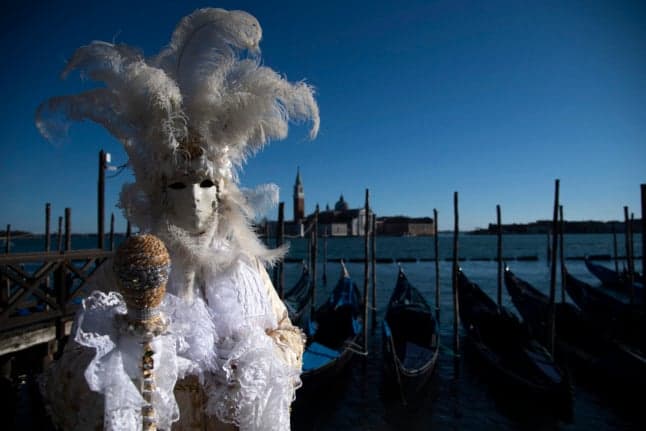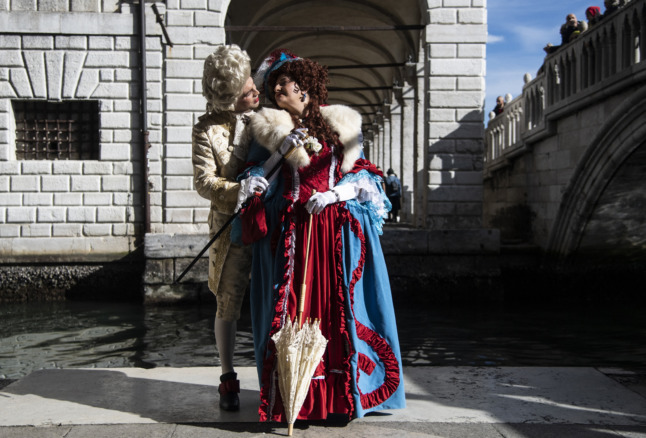What changes about life in Italy in February 2023

From carnival celebrations to tax reform announcements, here's what people living in Italy can expect next month.
Carnival
February in Italy is carnival season, and the most famous events of all are held in Venice, with celebrations this year running from February 4th-21st.
Participants can ride a gondola down the Grand Canal to attend the Grand Masquerade Ball at Palazzo Pisani Moretta and stuff themselves with fried treats like frittelle Veneziane.
Tickets for many events must be bought well in advance. Find the full festival programme and ticket information on the official website.
Venice is of course not the only part of Italy famed for its colourful fairs, parades and parties during carnival season.
While it might not be as well known internationally, Viareggio’s carnival has nothing to envy to Venice’s festivities and this year this small town on the Tuscan coast celebrates its 150th Carnevale from February 4th-25th.

A costumed couple poses on St Mark's Square during Venice's Carnival on February 13, 2022. Photo by Tiziana FABI / AFP
Every year Viareggio sees masked participants carry hundreds of papier-mâché floats along the seafront to music and dancing, in a truly unique spectacle.
Find more information about events and tickets here.
Sanremo Music Festival
February festivities continue with Italy’s most famous song competition, which is back for another year.
READ ALSO: Why is the Sanremo music festival so important to Italians?
Italy's answer to Eurovision, the Festival della canzone italiana di Sanremo is held in the Ligurian seaside town of the same name at Theatre Ariston, which has been the venue for the festival since 1977.
Artists will compete for the winning spot over five nights from February 7th – 5th.
Regional elections in Lazio and Lombardy
Italy's two most important regions - Lombardy around Milan, and Rome's Lazio - will hold local government elections on Sunday 12th and Monday 13th February.
Voting for members of the regional council, including the governor, will be open to all residents of these regions who have Italian citizenship, are over 18 years of age, and are registered on the electoral roll in your municipality.
You must vote in the town in which you're registered to vote, unless you're in a special category, such as soldiers or police officers stationed elsewhere.
Check your local comune's website for information on how to vote.
Valentine's Day
Italy celebrates Valentine’s Day in largely the same way as the rest of the world: it’s a heavily commercialised holiday during which couples can expect to spend over the odds on a weekend away or a meal out.
That said, St Valentine is widely believed to have been an Italian saint (or several), and is the patron saint of multiple Italian towns including Terni, Padua, Sadali in Sardinia, Quero and Pozzoleone in Veneto, Palmoli in Abruzzo, and Vico del Gargano in Puglia.
Each of these towns has their own way of celebrating the day – in Palmoli, the floor of the Church of Santa Maria delle Grazie is covered in laurel leaves, while Quero has a tradition of blessing oranges and throwing them off a hill near the Church of St Valentine for good luck.
Verona, where Shakespeare set Romeo and Juliet and which has appointed a particular balcony in the historic centre ‘Juliet’s balcony’, has embraced the kitschier aspects of the festival, and every year puts on the four-day-long Valentines-themed event ‘Verona in Love‘.
What does make Italy unique is the designation of February 15th as La Festa dei Single (Singles’ Day) or Festa di San Faustino (Feast of San Faustino).
EU-wide gas price cap comes in
On a much less romantic note, anyone worried about a repeat of the spikes in gas and energy prices we saw in 2022 may be somewhat reassured by the EU-wide price cap that will come into force across the bloc from February 15th.
Gas prices in Europe have been falling again in recent weeks, but any future price shocks should be contained by the cap, which will protect consumers from gas price spikes over 180 euros per megawatt hour.
While gas prices in Italy and elsewhere in Europe shouldn't reach the eye-watering figures recorded last year, analysts say tariffs will still remain far higher than pre-crisis levels.
Tax reforms on the way
This month we can also expect to find out what the government’s plans are for the first step in planned major tax reforms, which are thought likely to simplify, if not lower, taxes for many workers and households.
The government says its aim within its five-year term is to extend the 15 percent flat tax rate, which currently applies to self-employed workers earning under 85,000 a year, to others, including employees and pensioners.
READ ALSO: Flat tax, superbonus and wild boar: What’s in Italy’s 2023 budget?
It’s not yet clear what the first steps towards this will look like, though the government is expected to announce some initial changes to the income tax system, according to media reports.
Changes to the way tax is calculated for families and the rates of VAT applied to many products are also expected, though no details have been given so far.
The first draft of the new bill on budget reform will come “between February and March”, according to the deputy finance minister.
Comments (1)
See Also
Carnival
February in Italy is carnival season, and the most famous events of all are held in Venice, with celebrations this year running from February 4th-21st.
Participants can ride a gondola down the Grand Canal to attend the Grand Masquerade Ball at Palazzo Pisani Moretta and stuff themselves with fried treats like frittelle Veneziane.
Tickets for many events must be bought well in advance. Find the full festival programme and ticket information on the official website.
Venice is of course not the only part of Italy famed for its colourful fairs, parades and parties during carnival season.
While it might not be as well known internationally, Viareggio’s carnival has nothing to envy to Venice’s festivities and this year this small town on the Tuscan coast celebrates its 150th Carnevale from February 4th-25th.

Every year Viareggio sees masked participants carry hundreds of papier-mâché floats along the seafront to music and dancing, in a truly unique spectacle.
Find more information about events and tickets here.
Sanremo Music Festival
February festivities continue with Italy’s most famous song competition, which is back for another year.
READ ALSO: Why is the Sanremo music festival so important to Italians?
Italy's answer to Eurovision, the Festival della canzone italiana di Sanremo is held in the Ligurian seaside town of the same name at Theatre Ariston, which has been the venue for the festival since 1977.
Artists will compete for the winning spot over five nights from February 7th – 5th.
Regional elections in Lazio and Lombardy
Italy's two most important regions - Lombardy around Milan, and Rome's Lazio - will hold local government elections on Sunday 12th and Monday 13th February.
Voting for members of the regional council, including the governor, will be open to all residents of these regions who have Italian citizenship, are over 18 years of age, and are registered on the electoral roll in your municipality.
Check your local comune's website for information on how to vote.
Valentine's Day
Italy celebrates Valentine’s Day in largely the same way as the rest of the world: it’s a heavily commercialised holiday during which couples can expect to spend over the odds on a weekend away or a meal out.
That said, St Valentine is widely believed to have been an Italian saint (or several), and is the patron saint of multiple Italian towns including Terni, Padua, Sadali in Sardinia, Quero and Pozzoleone in Veneto, Palmoli in Abruzzo, and Vico del Gargano in Puglia.
Each of these towns has their own way of celebrating the day – in Palmoli, the floor of the Church of Santa Maria delle Grazie is covered in laurel leaves, while Quero has a tradition of blessing oranges and throwing them off a hill near the Church of St Valentine for good luck.
Verona, where Shakespeare set Romeo and Juliet and which has appointed a particular balcony in the historic centre ‘Juliet’s balcony’, has embraced the kitschier aspects of the festival, and every year puts on the four-day-long Valentines-themed event ‘Verona in Love‘.
What does make Italy unique is the designation of February 15th as La Festa dei Single (Singles’ Day) or Festa di San Faustino (Feast of San Faustino).
EU-wide gas price cap comes in
On a much less romantic note, anyone worried about a repeat of the spikes in gas and energy prices we saw in 2022 may be somewhat reassured by the EU-wide price cap that will come into force across the bloc from February 15th.
Gas prices in Europe have been falling again in recent weeks, but any future price shocks should be contained by the cap, which will protect consumers from gas price spikes over 180 euros per megawatt hour.
While gas prices in Italy and elsewhere in Europe shouldn't reach the eye-watering figures recorded last year, analysts say tariffs will still remain far higher than pre-crisis levels.
Tax reforms on the way
This month we can also expect to find out what the government’s plans are for the first step in planned major tax reforms, which are thought likely to simplify, if not lower, taxes for many workers and households.
The government says its aim within its five-year term is to extend the 15 percent flat tax rate, which currently applies to self-employed workers earning under 85,000 a year, to others, including employees and pensioners.
READ ALSO: Flat tax, superbonus and wild boar: What’s in Italy’s 2023 budget?
It’s not yet clear what the first steps towards this will look like, though the government is expected to announce some initial changes to the income tax system, according to media reports.
Changes to the way tax is calculated for families and the rates of VAT applied to many products are also expected, though no details have been given so far.
The first draft of the new bill on budget reform will come “between February and March”, according to the deputy finance minister.
Join the conversation in our comments section below. Share your own views and experience and if you have a question or suggestion for our journalists then email us at [email protected].
Please keep comments civil, constructive and on topic – and make sure to read our terms of use before getting involved.
Please log in here to leave a comment.